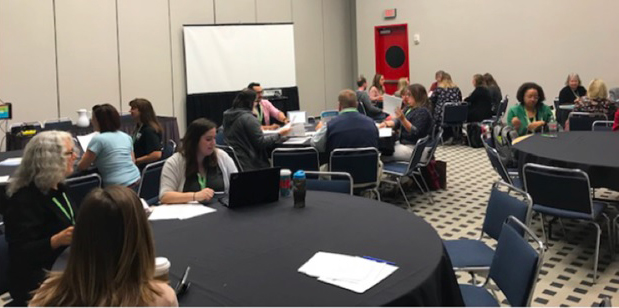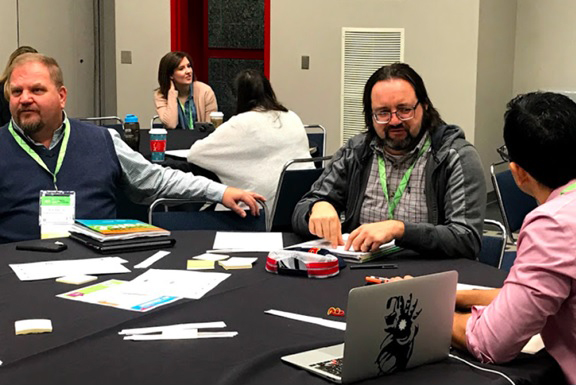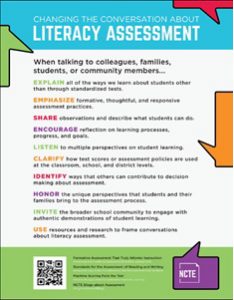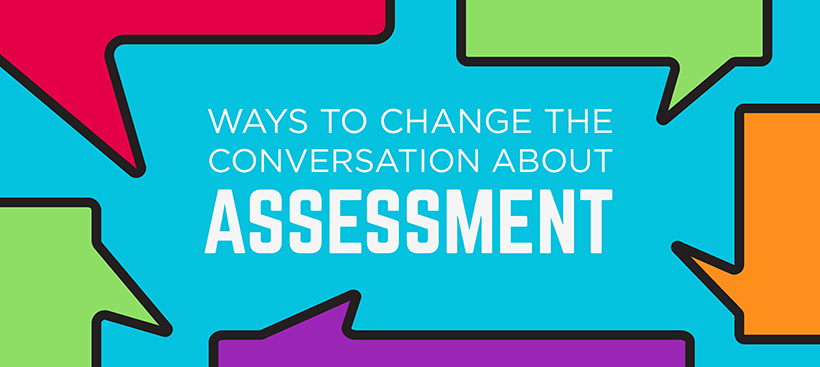This blog was written by Peggy O’Neill and the NCTE Standing Committee on Literacy Assessment.
The NCTE 2018 Annual Convention was a great opportunity to continue “Changing the Conversation about Literacy Assessment,” one of our committee’s goals for this year.
About 25 people joined us bright and early on Saturday, November 17, for lively discussions about ways to use assessment to improve teaching and learning. Attendees, who came from a variety of settings K-college, shared classroom strategies for using assessment to promote literacy learning.

Kathi Yancey reported that her roundtable focused on “how assessment is enriched with the inclusion of a reflection via a student perspective and how reflection provides a link between assessment and classroom practice. In this kind of assessment, context is an important part of the practice.”
Another table focused on families as literacy assessment partners. Kathryn Mitchell Pierce, who led this discussion, noted that many of the teachers at her table talked about the demand for Title I schools to work with families and community members.
NCTE’s vision statement, as well as the NCTE/ILA Standards for Assessment of Reading and Writing, acknowledge the importance of engaging with family and community in children’s literacy learning and call upon educators to collaborate with them in designing assessment practices. NCTE resources, such as Kathryn’s book, co-authored with Rosario Ordoñez-Jasis, support teachers looking for collaborative assessment ideas.
The conversation at Becky McCraw’s table revolved around the quote, “When you change the way you look at things, the things you look at change.” This quote helped the teachers at Becky’s table recognize the need for a change in our mindsets regarding assessments. All agreed that formative assessments are a crucial part of the responsive and recursive cycle of teaching (the what, the so what, and now what). One strategy Becky shared for formative assessment is using written conversation as a tool in early and middle childhood.

Bobbie Kabuto’s roundtable talked about “literacy configurations (the ways that students use reading and writing to participate in activity and how these configurations are like fingerprints) and literacy manifestations (how reading and writing manifests itself alongside other people and things in their environment).” Bobbie reported that they also talked about how students can align their reading identities with book leveling, and teachers shared their experiences with that strategy. She explained that they also talked about ways that teachers can engage in close observations of students in order to get a better profile of their students as literate individuals, or their learning biographies.
The secondary roundtables, according to discussion leader Josh Flores, focused on collecting feedback from participants about their district’s assessment goals or challenges. This was used to lead discussion and share assessment routines and research for implementing meaningful formative assessments. As an example, Josh explained that they took on the perspective of an ad hoc professional learning community team and practiced the messy art of coming to consensus about what literacy skills should be the focus for building common formative assessments.
At my table, participants shared the pros and cons of rubrics. For example, rubrics can help develop a shared language when talking about writing, but they can also undermine the contextual nature of writing and get in the way of authentic writing tasks. We also shared ways we attempt to circumvent the standardization associated with rubrics linked to many mandated writing assessments. One idea was the single point rubric and another was to co-create rubrics for specific assignments with the students.
Beyond the roundtables, our poster with ideas for how you can change the conversation about assessment was on view in the convention center and is available for free download here.

We are already looking forward to more conversations with you next year in Baltimore at the NCTE 2019 convention. Please let us know if you have ideas for our roundtable discussions or are interested in helping us change the conversation. You can email me at poneill1@loyola.edu.
NCTE Standing Committee on Literacy Assessment
CHAIR, Peggy O’Neill (Loyola University, Baltimore, MD)
Scott Filkins (Central High School, Champaign, IL)
Josh Flores (Birmingham, AL)
Bobbie Kabuto (Queens College, Flushing, NY)
Becky McCraw (Goucher Elementary School, Gaffney, SC)
Kathryn Mitchell Pierce (Saint Louis University, MO)
Elisa Waingort (Calgary, Alberta, Canada)
Kathleen Blake Yancey (Florida State University, Tallahassee)

